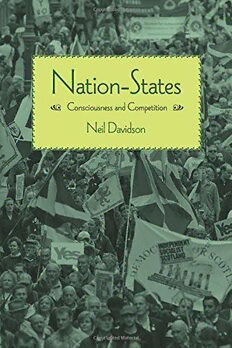
Nation-States: Consciousness and Competition PDF
Preview Nation-States: Consciousness and Competition
NationStates_Cover_Draft9.pdf 1 3/11/16 12:12 PM N I Praise for How Revolutionary Were N THIS insightful new collection of essays, promi- a t the Bourgeois Revolutions? and nent Scottish Marxist Neil Davidson brings his formi- io n Holding Fast to an Image of the Past dable analytical powers to bear on the concept of the - S capitalist nation-state. Through probing inquiry t “I was frankly pole-axed by this magnifi- Davidson draws out how nationalist ideology and conscious- a Nation–States t cent book. Davidson resets the entire e ness are used to bind the subordinate classes to “the nation,” s debate on the character of revolutions: while “the state” is simultaneously wielded by capital as a bourgeois, democratic, and socialist. He’s means of conducting geopolitical competition. The questions sending me, at least, back to the library.” Davidson takes up—from the extent to which nationalism Consciousness and Competition —Mike Davis, author of Planet of Slums (cid:27) (cid:25) can be a component of left-wing politics to the difference “This is, quite simply, between bourgeois and socialist revolutions—have wide- Neil Davidson the finest book of its kind.” ranging implications for today’s activists and historians. —Tony McKenna, C Marx and Philosophy Review of Books M Y “This is Neil Davidson at his very best. In (cid:28)(cid:29)(cid:30)(cid:31) CM a sparkling set of essays, Davidson offers MY a conceptually sophisticated and histori- CY cally wide-ranging analysis of the work of CMY classical and contemporary political K thinkers. . . . In terms of its depth of learning it stands in comparison with Neil Davidson is the author of Discovering the Scottish Revolution Perry Anderson’s Zone of Engagement. (2003), for which he was awarded the Deutscher Prize; How An essential read.” N Revolutionary Were the Bourgeois Revolutions? (2012); Holding Fast to —Satnam Virdee, professor of an Image of the Past (2014); and We Cannot Escape History (2015). e sociology, University of Glasgow i l Davidson lectures in sociology in the School of Political and D Social Science at the University of Glasgow, Scotland. “Holding Fast to an Image of the Past is a illuminating, authoritative, and some- v i times very funny. . . . This new collection d s fruitfully combines wide-ranging o Political Science $22 erudition with vivid vignettes.” n —Bridget Fowler, emeritus professor of sociology, University of Glasgow www.haymarketbooks.org NationStates_Text_5_Layout 1 3/9/16 5:15 PM Page i Nation-States NationStates_Text_5_Layout 1 3/9/16 5:15 PM Page ii NationStates_Text_5_Layout 1 3/9/16 5:15 PM Page iii Nation-States Consciousness and Competition (cid:1) (cid:2) NEIL DAVIDSON Haymarket Books Chicago, Illinois NationStates_Text_5_Layout 1 3/9/16 5:15 PM Page iv © 2016 Neil Davidson Published in 2016 by Haymarket Books PO Box 180165 Chicago, IL 60618 773-583-7884 www.haymarketbooks.org [email protected] ISBN: 978-1-60846-568-2 Trade distribution: In the US, Consortium Book Sales and Distribution, www.cbsd.com In Canada, Publishers Group Canada, www.pgcbooks.ca In the UK, Turnaround Publisher Services, www.turnaround-uk.com All other countries, Publishers Group Worldwide, www.pgw.com Cover design by Eric Kerl. Cover image of pro-independence marchin Edinburgh supporting a Scottish independence referendum to be held on September 18, 2014. This book was published with the generous support of Lannan Foundation and the Wallace Action Fund. Printed in Canada by union labor. Library of Congress Cataloging-in-Publication data is available. 10 9 8 7 6 5 4 3 2 1 NationStates_Text_5_Layout 1 3/9/16 5:15 PM Page v For Alan Rae NationStates_Text_5_Layout 1 3/9/16 5:15 PM Page vi NationStates_Text_5_Layout 1 3/9/16 5:15 PM Page vii Contents Preface ix 1. The Trouble with “Ethnicity” 1 2. What Is National Consciousness? 31 3. From National Consciousness to Nation-States 51 4. Marxism and Nationhood: Two Replies to John Foster 77 4.1 Stalinism, “Nation Theory,” and Scottish History 4.2 The Public Memoirs and Confessions of an Unconscious Weberian u 5. Enlightenment and Anti-Capitalism 119 6. Islam and the Enlightenment 175 u 7. The Necessity of Multiple Nation-States for Capital 187 8. Far-Right Social Movements as a Problem for Capital 247 u 9. A Scottish Watershed 291 Notes 311 Index 367 NationStates_Text_5_Layout 1 3/9/16 5:15 PM Page viii NationStates_Text_5_Layout 1 3/9/16 5:15 PM Page ix Preface T he term “nation-state” conjoins two others: “nation,” a collective social identity; and “state,” a structure of political power. Territorial states have existed since the emergence of class society around 3000 BCE, but nation-states are a much more recent phenomenon—so recent, in fact, that they are characteristic of only one type of class society, cap- italism, whose origins lie a mere five hundred years ago, and which at- tained complete global dominance only in the late twentieth century. Yet although the two aspects of nation-states are inseparable, the aca- demic literature, including that written by Marxists, tends to discuss them in the context of separate disciplinary fields: adherence to national identity is a subject for social psychology, or perhaps the cultural studies branch of sociology; relationships between states are the province of the international relations wing of political science. Writers who do attempt to deal with both aspects of nation-states tend to either oscillate between collective identity and political structure or treat them in historical sequence. In Hagen Schulze’s impressive survey of European states from the era of Charlemagne, for example, the first three parts of his book are respectively titled “States,” “Nations,” and “Nation-States”; but the subject matter of the third simply reverts to that of the first: it emphasizes states at the expense of their national form.1Most discussions, however, do not even make these distinctions and simply use “nation” as a synonym for “state” throughout.2 ix
